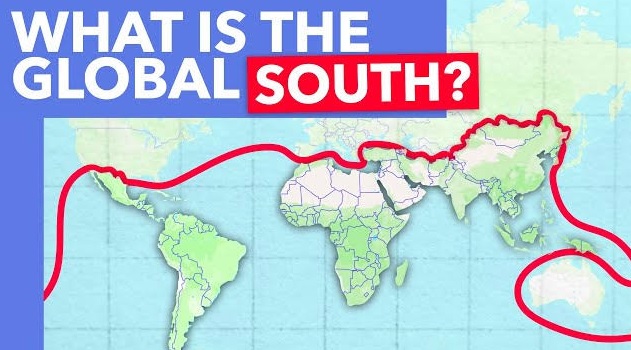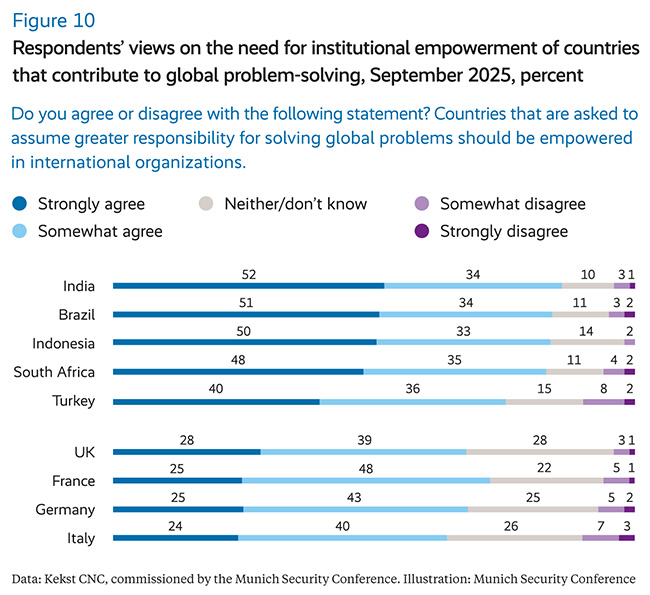 Pic.: You Tube
Pic.: You Tube
With the United States leaving an empty chair at this weekend’s G-20 summit in Johannesburg, one question will undoubtedly loom over the meeting’s agenda: Who will fill the many global governance gaps that Washington has opened in recent months? – ‘Foreign Policy’ notes.
A new survey conducted on behalf of the Munich Security Conference asked citizens from nine G-20 member states in Europe and across the global south about their views on a world with less reliable leadership from Washington. The data shows that respondents believe the United States is abandoning its global leadership role in some, many, or all policy areas, ranging from 47 percent of respondents in Turkey to 78 percent in India. Many expressed concerns about the disruptive effects of U.S. policy on efforts to ensure global economic stability, resolve violent conflicts around the world, and fight global climate change, among other critical issues.
As the United States retreats, European leaders frequently emphasize their desire to “have more friends” in Africa, Asia, Latin America, and the Middle East. But beyond new trade negotiations conducted by the European Commission, Europe has relatively few concrete initiatives to show for it. European governments have certainly been preoccupied with Russia’s war in Ukraine, growing economic uncertainty at home, and the mounting troubles in the trans-Atlantic relationship. But the reasons for their reluctant outreach may go much deeper — and reflect broader skepticism about the merits of deeper collaboration with governments in other parts of the world.
This skepticism is certainly evident within European societies, as reflected in the public opinion data we commissioned. When asked how much powerful non-Western countries — specifically, Brazil, China, India, Indonesia, Russia, South Africa, and Turkey — are pulling their weight in solving global problems on a scale from zero (not pulling their weight at all) to 10 (pulling their weight completely), European respondents in France, Germany, Italy, and the United Kingdom rated these countries’ contributions at five or (well) below.

These perceptions are at odds with the many examples of global south leadership on solving global problems and providing global public goods, which European cooperation could build on. If not judged solely by financial but also diplomatic, operational, and knowledge contributions, leadership from countries in the global south proves widespread. It cuts across different policy domains, including contributions to peace and security; global economic stability; the fight against climate change and global health crises; and the protection of human rights and dignity.
Likewise, global south governments have successfully mediated in many protracted conflicts. Cuba, for instance, brokered the 2016 peace agreement between the Colombian government and the FARC guerrilla group; China helped seal the 2023 Iran-Saudi Arabia deal; and Qatar led the 2020 agreement between the United States and the Taliban. The fight against climate change has seen particularly active diplomatic and thought leadership by the global south, especially by Pacific island states, which have launched a wide variety of initiatives pushing for stronger climate targets.
Our survey data suggests that within European societies, there is very little awareness of these multifaceted contributions.
Focusing too intently on these specific disappointments may blind the West to the many global south-led efforts that cooperation could build on. To fill the widening gaps in global leadership, Europeans would be well advised to take a more nuanced look at the contributions of governments in Africa, Asia, Latin America, and the Middle East when it comes to promoting international peace and security, economic stability, global health, climate protection, and human rights and dignity.
read more in our Telegram-channel https://t.me/The_International_Affairs

 11:21 27.11.2025 •
11:21 27.11.2025 •






















